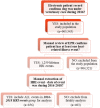Proposing the VetCompass clinical grading tool for heat-related illness in dogs
- PMID: 33767275
- PMCID: PMC7994647
- DOI: 10.1038/s41598-021-86235-w
Proposing the VetCompass clinical grading tool for heat-related illness in dogs
Abstract
Heat-related illness is a potentially fatal condition in dogs. Rapid and accurate recognition of the severity can improve clinical management in affected dogs and lead to better outcomes. This study explored retrospective VetCompass veterinary clinical records to investigate the clinical signs recorded for dogs presenting with heat-related illness to primary-care veterinary practice from 2016 to 2018. The relative risk of death associated with these clinical signs was reported and used to develop a novel clinical grading tool. From the clinical records of 856 heat-related illness events, the most frequently recorded clinical signs were respiratory changes (68.73%) and lethargy (47.79%). The clinical signs with the highest relative risk of death were neurological dysfunction, gastrointestinal haemorrhage and bleeding disorders. The novel VetCompass Clinical Grading Tool for Heat-Related Illness in dogs defines three grades: mild (altered respiration, lethargy), moderate (gastrointestinal signs, a single seizure, episodic collapse) and severe (neurological dysfunction, gastrointestinal haemorrhage, bleeding disorders). This novel grading tool offers a simple, evidence-based device to improve recognition of heat-related illness in dogs and promote improved decision-making for earlier interventions such as cooling and hospitalisation. This could improve outcomes and protect the welfare of dogs in the face of rising global temperatures.
Conflict of interest statement
The authors declare no competing interests.
Figures



Similar articles
-
Risk Factors for Severe and Fatal Heat-Related Illness in UK Dogs-A VetCompass Study.Vet Sci. 2022 May 11;9(5):231. doi: 10.3390/vetsci9050231. Vet Sci. 2022. PMID: 35622759 Free PMC article.
-
Epidemiology of heat-related illness in dogs under UK emergency veterinary care in 2022.Vet Rec. 2024 Jun 1;194(11):e4153. doi: 10.1002/vetr.4153. Epub 2024 May 23. Vet Rec. 2024. PMID: 38783549
-
Incidence and risk factors for heat-related illness (heatstroke) in UK dogs under primary veterinary care in 2016.Sci Rep. 2020 Jun 18;10(1):9128. doi: 10.1038/s41598-020-66015-8. Sci Rep. 2020. PMID: 32555323 Free PMC article.
-
Gastrointestinal Tract Dysfunction With Critical Illness: Clinical Assessment and Management.Top Companion Anim Med. 2019 Jun;35:47-52. doi: 10.1053/j.tcam.2019.04.002. Epub 2019 Apr 12. Top Companion Anim Med. 2019. PMID: 31122688 Review.
-
Exertional heat illness: a review of the syndrome affecting racing Thoroughbreds in hot and humid climates.Aust Vet J. 2016 Jul;94(7):240-7. doi: 10.1111/avj.12454. Aust Vet J. 2016. PMID: 27349884 Review.
Cited by
-
Heat stroke in dogs: Literature review.Vet Med (Praha). 2022 Apr 14;67(7):354-364. doi: 10.17221/144/2021-VETMED. eCollection 2022 Jul. Vet Med (Praha). 2022. PMID: 39100130 Free PMC article. Review.
-
Exploring Owner Perceptions of the Impacts of Seasonal Weather Variations on Canine Activity and Potential Consequences for Human-Canine Relationships.Animals (Basel). 2021 Nov 19;11(11):3302. doi: 10.3390/ani11113302. Animals (Basel). 2021. PMID: 34828033 Free PMC article.
-
Risk Factors for Severe and Fatal Heat-Related Illness in UK Dogs-A VetCompass Study.Vet Sci. 2022 May 11;9(5):231. doi: 10.3390/vetsci9050231. Vet Sci. 2022. PMID: 35622759 Free PMC article.
-
Surveillance of heat-related illness in small animals presenting to veterinary practices in the UK between 2013 and 2018.Open Vet J. 2022 Jan-Feb;12(1):5-16. doi: 10.5455/OVJ.2022.v12.i1.2. Epub 2022 Jan 3. Open Vet J. 2022. PMID: 35342739 Free PMC article.
-
Environmental effects on explosive detection threshold of domestic dogs.PLoS One. 2024 Sep 25;19(9):e0306817. doi: 10.1371/journal.pone.0306817. eCollection 2024. PLoS One. 2024. PMID: 39321177 Free PMC article.
References
-
- Johnson SI, McMichael M, White G. Heatstroke in small animal medicine: A clinical practice review. J. Vet. Emerg. Crit. Care. 2006;16:112–119. doi: 10.1111/j.1476-4431.2006.00191.x. - DOI
Publication types
MeSH terms
LinkOut - more resources
Full Text Sources
Other Literature Sources
Medical

